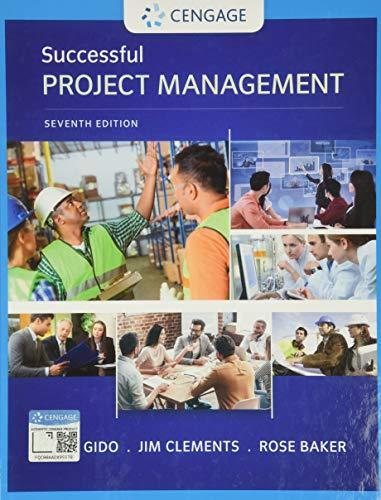Question
For this task you will take the role of an individual applying to lead a project described for the organisation you have selected from the
For this task you will take the role of an individual applying to lead a project described for the organisation you have selected from the options in the Assessment 3 tab in your subject site.
The focus of this Expression of Interest is to demonstrate why you are a good fit for the selected project based on your learning in IKC101.
Context:
You are submitting an Expression of Interest (EOI) to lead a project connected to the organisation you have chosen. You are required to explain your professional philosophy and demonstrate an understanding of the historical and institutional influences on the field in which the organisation operates. In addition, you will review your standpoint reflections in Tasks 1 & 2to describe how you would enact your evolved understandings in the Project Manager role. A critical part of the project is to work with local Indigenous community or groups to build connections to interpret and respond to their needs.
You will complete a EOI - Project Manager in three sections. You must support your EoI with evidence from your sources, using APA (7th ed.) referencing.
- Section 1. Explain your professional standpoint as it applies to your cultural competence. Outline your contribution toYindyamarra Winhanganha. (300 w)
- Section 2. Describe the social, institutional, and historical factors relevant to the project. Explain the relevant ethical issues. (600 w)
- Section 3. What principles will you apply to establish and build collaborative partnerships with Indigenous community representatives or groups? (300 w)
Your final assessment task for IKC101 requires you to consider your previous learning across each module of the subject and apply it to an Expression of Interest. Each assessment task has asked you to reflect on and critically analyse specific elements of your standpoint through your engagement with the learning activities: that is, the social, institutional, and historical factors that influence knowledge. Reference requirements
- You must use a minimum of five (5) Required Readings from the IKC101 modules.
- You must use at least two (2) reference sources in each of these sections. Use at least seven (7) reference sources in total. Your Reference List is not included in the word count but your in-text references are.
- You must cite and reference two (2) additional sources. These sources can be from the Required Readings or ones that you have located yourself. These texts must be of academic standard, such as a journal article, textbook, or book chapter. Assess the quality of content in web sources very carefully. In general, website references are unlikely to provide reliable, researched information suitable for this task.
- Do not reference informational sources such as Creative Spirits, Wikipedia, or Australians Together.
- Do not cite or reference the module. You may cite and reference the subject readings linked to in the module. The written information contained in the modules are not academic sources and are not to be used in your assessment task.
- Use in-text citations to identify other people's ideas and words. These in-text citations must follow APA (7th ed.) referencing style.
- Quotes must be in quotation marks and the in-text citation must include the page number.
- If you submit an oral presentation your script must be fully referenced and you can also indicate your references orally.
use these five refrences from the required reading and the other use your own one total 7 refrences:
1- Russell, G. (2020). Reflecting on a Way of Being: Anchor Principles of Cultural Competence. In J. Frawley, G. Russell & J. Sherwood (Eds.), Cultural Competence and the Higher Education Sector (pp. 31-42). Springer. https://doi-org.ezproxy.csu.edu.au/10.1007/978-981-15-5362-2_3
2- Elder, C. (2008). Chapter 1: Imagining Nations. Being Australian: Narratives of national identity (1st edition). Taylor and Francis Group. ProQuest Ebook Central, https://ebookcentral.proquest.com/lib/CSUAU/detail.action?docID=5971820.
3- Fear of the half Caste in:Beresford, Q., & Omaji, P. (1998). Our state of mind: racial planning and the stolen generations. Fremantle: Fremantle Arts Centre Press https://csulibrary.alma.exlibrisgroup.com/discovery/delivery/61CSU_INST:61CSU/12129959130002357?lang=en&viewerServiceCode=DigitalViewer
4- Moore, R. (2017). 'History textbooks still imply that Australians are White'. The Conversation, https://theconversation.com/history-textbooks-still-imply-that-australians-are-white-72796
5- Randell-Moon, H. (2019). Introduction. In H. Randell-Moon (Ed.),Incarceration, Migration and Indigenous Sovereignty: Thoughts on Existence and Resistance in Racist Times (pp. 8-10, 12-14). Dubbo: Space, Race, Bodies.
6- Aboriginal and Torres Strait Islander Social Justice Commissioner (2021). Closing the Gap: Report 2021. https://humanrights.gov.au/our-work/closing-gap/closing-gap-report-2021
7-National Aboriginal and Torres Strait Islander Health Plan 2013-2023. https://www.health.gov.au/resources/publications/national-aboriginal-and-torres-strait-islander-health-plan-2013-2023
Step by Step Solution
There are 3 Steps involved in it
Step: 1

Get Instant Access to Expert-Tailored Solutions
See step-by-step solutions with expert insights and AI powered tools for academic success
Step: 2

Step: 3

Ace Your Homework with AI
Get the answers you need in no time with our AI-driven, step-by-step assistance
Get Started


